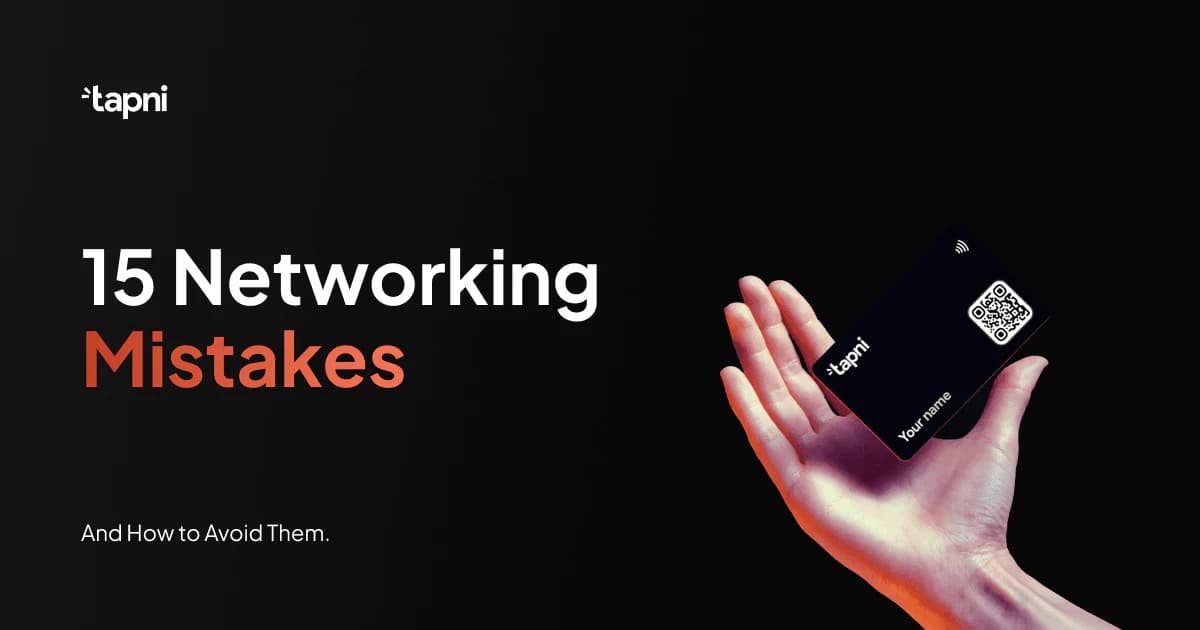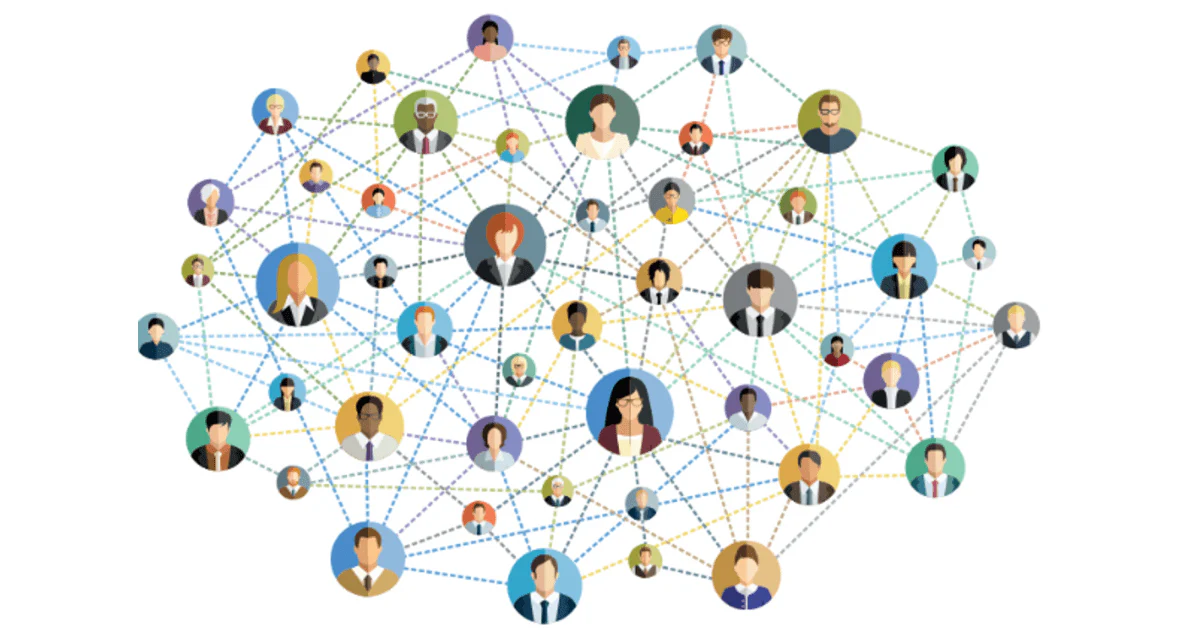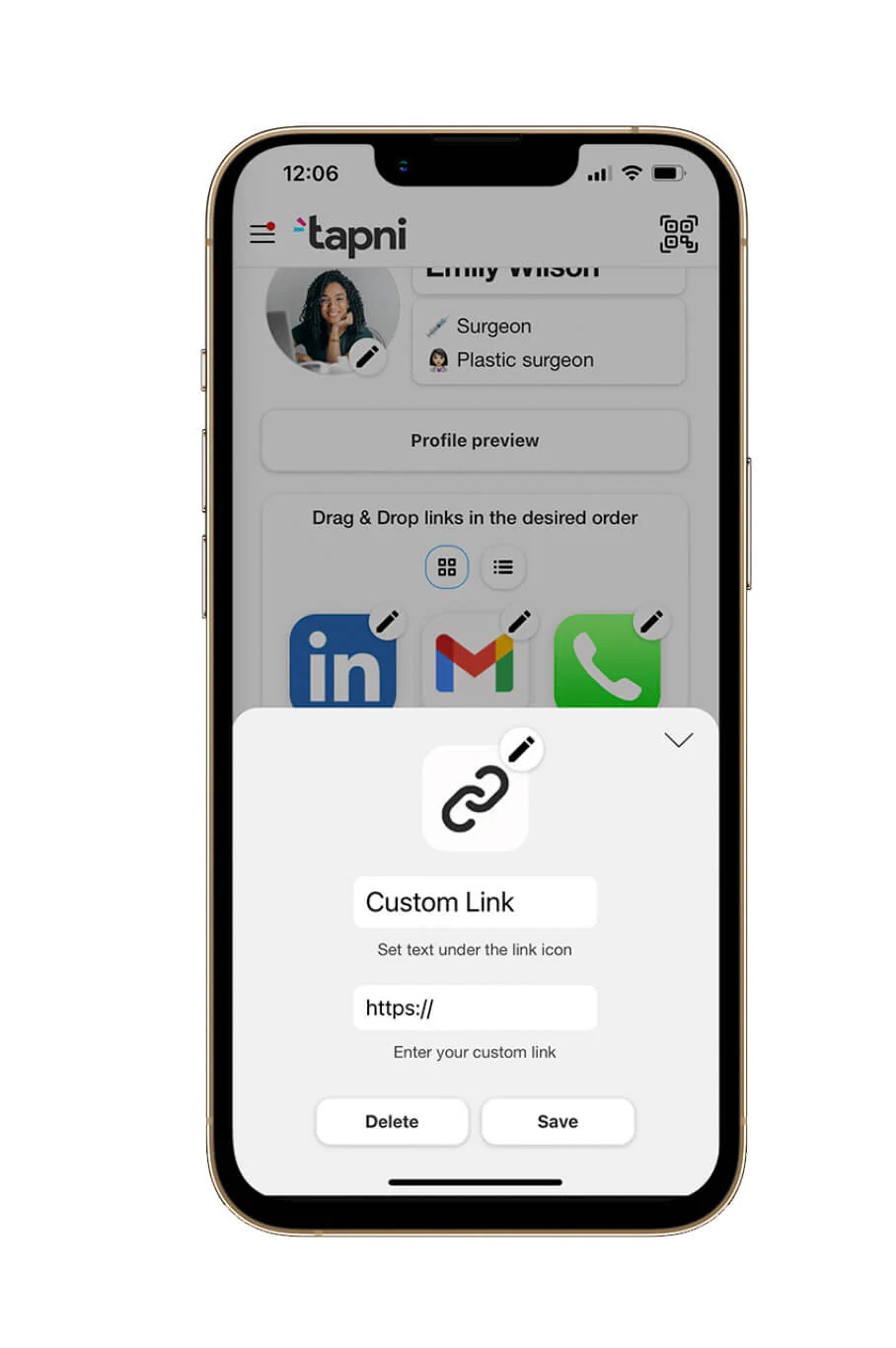Browse our comprehensive product guides and documentation


Networking is crucial for building relationships and opening doors that may have otherwise remained closed.
However, as important as networking is, it's not always easy.
In fact, people make many common networking mistakes when trying to network effectively.
So join us as we share the most prevalent networking mistakes, and learn how to avoid them to enhance and maximize the benefits of networking.
Ready?
Let’s get started!

Knowing why networking is so important will make avoiding networking mistakes even more meaningful.
So here are a few facts on why you should network and what it can bring you:
Overall, the benefits of networking go far beyond just meeting people - if done right, they provide essential professional skills while creating lifelong connections.
And now, let’s check 15 networking mistakes and how to avoid them.
Without a defined objective, you can find yourself aimlessly engaging in networking activities without purpose or direction. Think of it as going on a road trip without a map or destination.
Moreover, the lack of clarity can lead to wasted time, energy, and missed opportunities.
Therefore, you should approach networking strategically with a specific goal:
✨ Expanding professional connections
✨ Seeking job opportunities or
✨ Gaining industry insights.
Thus, a clear goal acts as a guiding light, helping you focus your efforts, make meaningful connections, and derive maximum value from your networking endeavors.
While showcasing your skills and achievements is important, constantly talking about yourself can turn people off.
You should provide valuable insights rather than engage in self-promotion.
Actually, the conversation can only remain objective, informative, and unbiased by avoiding self-promotion.
Therefore, sharing genuine advice and experiences allows for a more open and authentic conversation while fostering an environment of learning and growth.
Sometimes in your wish to communicate a message, people may come across as aggressive or pushy.
It goes without saying that being overly aggressive can make others uncomfortable or even intimidated, creating an unfavorable impression that may harm your professional relationships.
Additionally, being pushy can come across as self-centered and may alienate potential contacts.
Demonstrating a respectful and considerate attitude can foster authentic connections that are more likely to result in fruitful collaborations and long-term professional partnerships.
|
Note: Don’t forget that networking is about building genuine connections and establishing mutual trust, which requires patience and respect for each other's boundaries. |
Following up after a networking event is crucial in building meaningful and lasting connections.
Furthermore, it demonstrates your genuine interest and professionalism, setting you apart from others who may overlook doing so.
By promptly reaching out to people you’ve met, you show appreciation for their time and the opportunity to connect.
As a result, you can reinforce the connection, share any relevant information or resources discussed during the event, and explore potential future collaboration or partnership opportunities.
In addition, it also allows you to stay fresh in the minds of the people you’ve met.
Thus, you increase the chances of them remembering you and potentially referring you to others in their network.
|
ProTip: Apps like Tapni allow you to set follow-up reminders so you won’t forget to reach out after the event. |
Doing research beforehand about the event's agenda, key speakers, the attendees will help you tailor your conversation topics and ensure informed discussion.
It will also help you create an elevator pitch to correspond to the type of the event.
You must prepare adequately to avoid feeling lost or not knowing what to talk about.
It’s worth mentioning that preparation for the event also includes bringing business cards.
And that leads us to mistake number 6.
Whether you use traditional business cards or their digital counterparts, they are an indispensable tool for any professional attending a networking event.
In a bustling networking event, business cards provide a glance into your professional identity and make you more memorable.

What’s more, if you use digital business cards, such as Tapni, you can easily and quickly exchange all the relevant info thanks to NFC technology.
|
Note: Did you know that with the Tapni app, you can scan traditional business cards and save the info? |
When attending a networking event, it is crucial to maintain a positive and professional image, which includes refraining from badmouthing former employers or colleagues.
Speaking ill of former employers or colleagues reflects poorly on your character and professionalism, raising doubts about your ability to handle conflicts or maintain confidentiality.
What’s more, word travels fast in professional circles, and your negative remarks may reach the very individuals you are trying to impress.
Overall, negativity doesn’t resonate well with most people - networking events are designed for building positive relationships and fostering a supportive environment.
It’s much wiser to highlight your strengths and accomplishments instead.
While it may be tempting to gravitate towards individuals with more seniority or higher positions, you shouldn’t underestimate the power of engaging with a diverse range of people.
Limiting conversations solely to those with seniority can hinder the range and knowledge you can gain from networking.
On the other hand, you can tap into fresh ideas, unique insights, and emerging trends by engaging with attendees at different career stages.
Thus, building relationships with peers and newcomers can foster collaborative learning, inspire innovation, and potentially lead to future partnership opportunities.
|
Note: Remember that networking is about building a diverse and robust professional network to support and contribute to personal and career growth in more than one way. |
It's crucial to strike a balance when making new business connections and avoid asking too much from them immediately.
Actually, asking for excessive favors or expecting immediate assistance can put unnecessary pressure on the connection and potentially hamper the budding relationship.
Therefore, it's important to approach new business connections with a mindset of mutual benefit, where both parties can contribute to and support each other's growth.
By showing patience, respect, and genuine interest in fostering a meaningful connection, you create a solid foundation for a productive and long-lasting business relationship.
Dressing appropriately at a networking event is crucial for making a positive and professional impression.
In general, your outfit speaks volumes about your level of professionalism, attention to detail, and respect for the event and its attendees.
In addition, by dressing appropriately, you demonstrate that you understand the significance of the event and are willing to invest the effort to present yourself in the best possible light.
Mingling presents a unique opportunity to connect with like-minded individuals, expand your professional network, and discover new possibilities.
And equally important, it helps you step out of your comfort zone. Commonly, people tend to stick around those they know well.
However, by doing so, you’re robbing yourself of the chance to broaden your horizons, exchange ideas, and build meaningful connections.
If you don’t mingle, you don’t open the door to new collaborations, partnerships, and career opportunities.
On the other hand, mingling allows you to showcase your expertise, establish your brand, and leave a lasting impression.
|
Note: Networking events often provide a supportive environment where you can gain confidence, refine your communication skills, and learn from the experiences of others. |
Networking events imply that the time is often limited, so knowing when to step away from the conversation and meet more attendees is essential.
One of the ways to leave a conversation with style is to thank the speaker for their time, exchange contact info if you find the person valuable, and move on.
One of the biggest struggles is finding the right balance between talking just enough and being too dominant.
There is nothing wrong with speaking up as long as the other party gets a chance to speak, too.
By breaking the silence and actively engaging in conversations, you can ask insightful questions, share your expertise, showcase your skills, etc.
Being proactive while paying genuine attention to what your speaker is saying can get you a long way.
And if you’ve done research prior to the event, you’ll be armed with plentiful possible topics to discuss.
Just as staying silent isn’t preferable, neither is dominating a conversation.
It can actually be counterproductive because when you monopolize a conversation, not only do you discourage others to share their thoughts, but you also fail to learn from their insights and experience.
If you step back and give others the space to contribute, you foster an environment of inclusivity and collaboration that can lead to fruitful discussions.
|
Note: Effective networking involves active listening, allowing for a genuine exchange of ideas and perspectives. |
Making new connections at a networking event is great, but while you’re out and about, it can happen that you don’t keep a record of the people you’ve met.
Thus, you fail to capture their names, professions, and key points of conversation.
And it’s really important - this “record” will help you recall important details and act as a personalized database for later reference.
Furthermore, keeping a record lets you organize and prioritize follow-ups effectively, ensuring you stay in touch with the right people and nurture those professional relationships over time.
|
ProTip: Digital solutions such as Tapni help you organize your contacts into separate lists and add tags. |
So this was our list of the 15 most common networking mistakes. It might be a lot to take in, but we hope you’ll find useful and practical tips.
However, before we wrap things up, let’s show you a digital solution called Tapni that can help you elevate your networking but also help you avoid these networking mistakes.
So how can you benefit from Tapni?
💣 You can create fully customizable and personalized digital business cards and accessories.
💣 You can directly send your new contacts to your CRM and schedule a follow-up reminder.
💣 You can automatically send messages to attendees who have visited your profile.
💣 You can (re)organize new contacts, regroup and move them, tag and label them, etc.
💣 You can use Tapni’s analytics tool to get valuable insights regarding the event, such as ROI measurement.
💣 You can create a custom link sending your new contact to the profile or social media page you want them to see.

💣 And so much more.
Ready to give it a go?
Create your Tapni profile today to avoid networking pitfalls and unlock the full potential of networking.
You should do research beforehand and come prepared.
In addition, you should bring digital business cards, mingle and engage in conversations while showing a genuine interest in your speaker.
You should see networking as an event where you get new insights but also contribute to others. In other words, you need to give and provide value in order to get the same in return.
The main signs of poor networking are sounding too pushy and arrogant, dominating conversations, and not actually listening to your speaker. In a nutshell, doing self-promotion instead of building relationships.
Keep Learning:
10 Virtual Networking Ideas You Should Implement Today